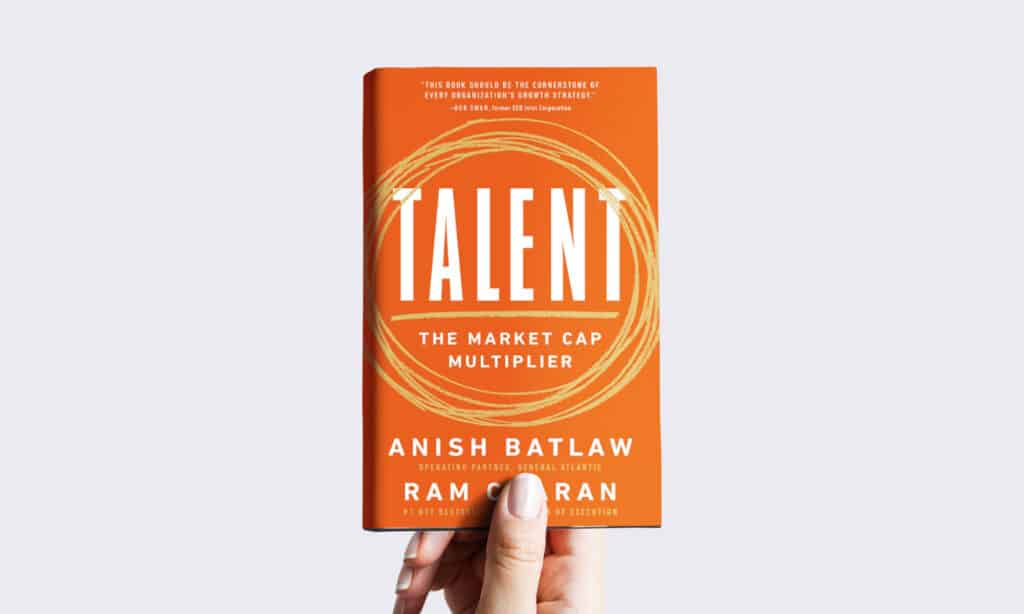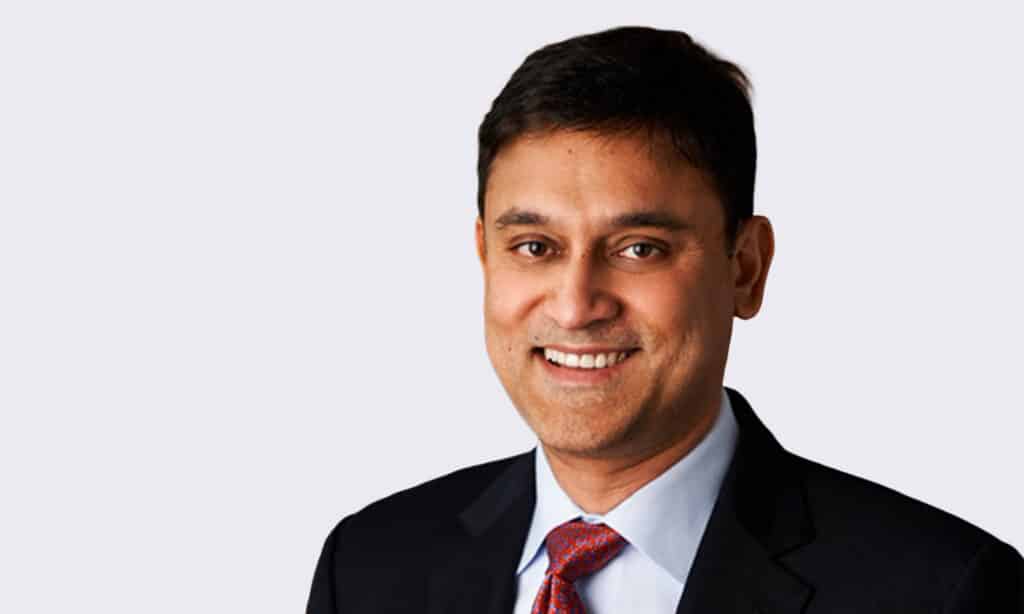Anish Batlaw on his new book, value creation and HR’s pivotal role

Anish Batlaw, Managing Director at the leading private equity firm General Atlantic, co-authored Talent, The Market Cap Multiplier, with New York Times best-selling author Ram Charan. We sat down with Anish after reading the book to discuss some key themes pertinent to the HR community. Get your copy here.
Why did you write this book and how did it come about?
About three years ago, Ram and I were having dinner at Indian Accent in New York City and our conversation turned to Private Equity and how the great firms are able to compress time to value creation. We discussed companies that were able to exponentially improve performance and others within the same sector who struggled. The key difference we concluded, was the quality of the leadership team and density of talent in the company.
We thought there was an important book to be written here. One that would describe a playbook that a CEO (or a Business leader) could leverage to build a leadership team that is equipped to create significant value or multiply the market cap over a four-year period. Ram calls it “3x in 4y” or “three times the market cap in four years”. We wanted to showcase a diverse set of real case studies to help business leaders understand the playbook and how it can be applied to companies both large and small, private and public, domestic and international.
Ram and I share a common mission – in that we are both committed to developing leaders and leadership teams! We think this book aligns well with our mission and will help leaders improve their ability to build high quality leadership teams.
How do you educate leaders on the importance of talent and the broader HR function, and weighing them the same as other leadership positions?
Great leaders know that talent is integral to the growth and performance of their organization. KPMG conducts a CEO survey every year and talent is consistently ranked at the top of their list. They recognize that talent is the differentiating factor in driving the performance of a business; however, consistently getting talent decisions right is difficult.
„Great leaders know that talent is integral to the growth and performance of their organization“
In companies where CHROs have demonstrated expertise in building the talent engine and cultivating a high-performance culture, the function is recognized and rewarded. High quality CHROs understand drivers of company performance and unlock value by ensuring that they have top talent in critical roles. However, in companies where the HR function is focused on administration of HR programs and processes, they are treated and rewarded accordingly.
The pressure on CEOs and growth company leaders is higher than ever before. Multiples have compressed and value will be derived from strong operating performance. CHROs will need to play a critical role in helping executives upgrade their expectations and standards on talent. Mediocrity hidden behind a high valuation environment will not be able to cut it anymore. On the other hand, ‚A‘ players will be highly sought out in a tight labor market. CHROs have a pivotal role to play in shaping and executing a talent strategy that can be a differentiator for their companies in this challenging economic environment.
It is essential from what you are saying for CHROs to be positioned at the top alongside other leaders. If you look currently at the business landscape, where do you think we are on that journey, as this hasn’t always been the case for HR?
There are many CHROs doing outstanding work! In companies where the function needs to be elevated, now is a perfect opportunity to be recognized as a value generating function.
HR leaders should focus their energy on building a highly productive and engaged workforce. They should be thinking about the “talent density” – i.e. ensuring a high concentration of ‚A‘ players in the most critical roles. An ‚A‘ player, by definition, is about eight times more productive than a B player and as such an improvement of even 10% in talent density can have a massive impact on business performance.
„If talent is the number one priority for CEOs, then it absolutely needs to be the number one priority for a CHRO“
Too frequently, CHROs are pulled into or focus on HR operations and processes, which while important for the business, does not have the highest impact. If talent is the number one priority for CEOs, then it absolutely needs to be the number one priority for a CHRO.
With a fast-changing commercial landscape and ever evolving workforce dynamics, are you seeing a shift in what talent looks for when evaluating opportunities?
As I alluded to earlier, the talent market is a lot more competitive now than it has ever been before. We’ve also seen compensation levels steadily rise, and the focus is no longer just on base salaries. Equity has become a significant part of the decision-making process for senior talent. They’re not just looking at a position or potential employer but they’re considering if they can underwrite and believe in the equity story.
With that being said, I think high caliber talent is looking for a lot more than just monetary compensation; they’re looking for opportunity more intensely than they have before. They’re assessing whether companies have solid business models and have potential to scale. The best talent gravitates towards companies where they feel deeply connected to the mission, which provides an inclusive, empowering and high performing culture, and stretch and challenging opportunities.
On the flipside, with the talent pool being so competitive, do you think firms are more willing to make certain trade-offs in what they’re looking for when hiring?
There was a point in time across most industries – particularly private equity, where it was just a case of simply finding an individual who had ‘been there and done that’. Although this may have had good success historically, I’ve found that in the current talent market place, this approach is no longer suitable.
„…companies will have to bet on potential not just on past experience.“
I’ve seen real life examples where individuals looked perfect on paper but were unable to succeed. As the talent market becomes more competitive and the pace of innovation and disruption increases, companies will have to bet on potential not just on past experience.
How do you identify potential?
Let us start with definitions – potential for us does not just mean the ability of the person to step up and do a slightly bigger job. Rather we assess if the person can think big, learn in an accelerated fashion and have an outsized impact on performance.
High potential executives are ambitious and set stretch goals for themselves and their teams. Not only do they bring a strong desire to learn but they are able to inspire their teams to do the same. They adapt to new situations and apply new learnings to drive results. They are dogged in their pursuit to find right answers to new and complex problems.
During interviews, we like to understand how the candidates performed when faced with a situation that they were unfamiliar with – what actions were taken to better understand the situation, what sources were tapped to accelerate learnings and how quickly did they test and adapt new strategies to drive results. Do they build mechanisms for their teams to learn, such as a cadence to do a post mortem on critical decisions and strategies?
Do you have any advice for leaders looking to improve their assessment skills?
If you are trying to build a swimming team and start by asking for a list of great swimmers, you might end up with the wrong list. To a father of a five-year-old girl, who is able to swim a full lap, she might be a great swimmer. But if you want your team to win an Olympic medal, you would like to have athletes on the team who have prior experience winning the nationals with a speed that is on par (if not better) than the top swimmers in the world.
Specificity around the desired performance outcomes is key to accurately assessing and identifying the right candidate for a key leadership role. For example, what are the revenue and margins today and where do they need to be 2-3 years out, what are the key drivers of performance, what new or improved capabilities might need to be developed. We call this building a scorecard and it provides the necessary standard or context for assessing candidates for a key role. Interviews should serve as a data collection exercise – that informs what (and how) the candidates have achieved in their prior roles and the relevance of that to the scorecard. This approach enables firms to hire ahead of the curve and bring in leaders that are familiar with where we want to be, not just where we are today.
This feeds into the “If It Ain’t Broke, Don’t Fix It” chapter of the book. What are businesses getting wrong here?
A lot of firms still follow one of the worst myths in the business world, which is “if it ain’t broke, don’t fix it”! To drive exponential performance, a more proactive approach is required to build capabilities ahead of the curve. This requires a more thorough understanding of both past and future drivers of performance to inform the talent strategy.
Great CEOs instinctively know they have people on the team who have been successful in the past but are not equipped to scale and have the courage to make the change. They put the business ahead of individual loyalties.
What’s your advice to HR professionals?
Stay on top of the key drivers of company performance and ensure you have top talent on the most critical initiatives.
Get your copy of Talent, The Market Cap Multiplier here

Anish Batlaw has spent the last 30 years building high-performing management teams at public and private companies. He is currently a Managing Director at General Atlantic, the global growth equity firm. He joined the firm in 2015 to lead their Human Capital efforts in support of their global portfolio companies. His responsibilities include development of management teams, board of directors, and executive compensation.
He previously held roles at PepsiCo, Microsoft, Novartis, and TPG Capital. He has served on the boards of Avon Products Limited, Alinta Holdings, HCP Global Holdings, and TPG Wholesale Private Limited. In 2021, Anish was named one of the Outstanding 50 Asian Americans in Business, an award given by the Asian American Business Development Center, the most prestigious forum highlighting the achievements of Asian American business professionals.



